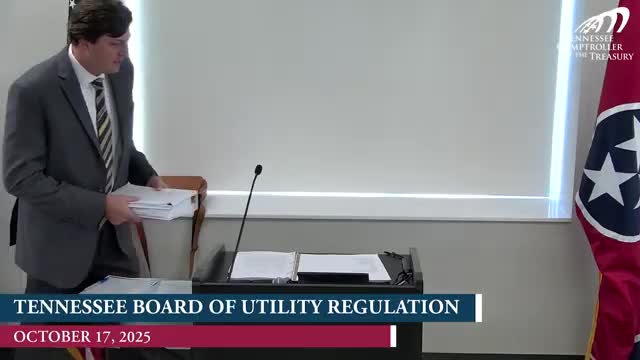Tennessee Board delays action after developers, county and utility dispute sewer and fire‑flow needs in Bedford County
Get AI-powered insights, summaries, and transcripts
Subscribe
Summary
The Tennessee Board of Utility Regulation took no action on a complaint from developer Tennessee Downs against Bedford County Utility District over water flow and fire suppression capacity along U.S. 231. Board staff will meet with parties and report back at the December meeting.
The Tennessee Board of Utility Regulation on Oct. 21 took no action on a complaint filed by Tennessee Downs against Bedford County Utility District (BCUD) after an extended public exchange among the developer’s representatives, the county commission and BCUD’s attorney.
The complaint centers on whether BCUD can or will provide adequate water flow and hydrant service needed for fire suppression and for a large private development planned along U.S. 231 in Bedford County. Complainants say a lack of timely, transparent cost and capacity information has delayed development and raised public‑safety concerns. BCUD’s attorney said the complaint is untimely and that the utility has been responsive to requests for information.
The matter drew testimony from Joe Lackey, representing Tennessee Downs; Chief Thomas, Bedford County fire chief; Greg Beck, Bedford County commissioner; and Dewey Branstetter, attorney for Bedford County Utility District. Lackey told the board Tennessee Downs and other investors have been unable to obtain “transparent cost, effective response time” or clear answers about whether BCUD can provide required fire flows and water for development. Chief Thomas described operational strains in the county’s fire response, saying crews sometimes haul water 20 miles because hydrants and adequate flow are not available near new subdivisions.
Beck told the board the corridor is the county’s primary economic growth area, citing more than $200 million in public and private investment, and urged the board to intervene so another utility with capacity could serve the corridor if BCUD will not partner on infrastructure. Branstetter, counsel for BCUD, urged dismissal, saying the complainant had not followed the board’s rules requiring parties first to seek relief from the utility’s governing board and arguing the complaint was filed less than a month after the parties began exchanging information.
Board staff recommended no immediate action and said staff would meet with all interested parties and report the results at the board’s December meeting; the board approved that approach. The board did not make factual findings or order a remedy at the Oct. 21 meeting.
Board staff and several board members stressed that the disagreement includes interlocking issues — fire protection, sewer provision, annexation and county planning — that require a coordinated local discussion before the board should impose remedies. Staff said it expects to convene interested parties and return with a report and recommendations in December.
The board’s decision preserves the complainant’s ability to refile or to pursue further steps if the local discussions and staff follow‑up do not resolve the dispute.
At the meeting the board recorded a motion for no action and the motion carried; no formal vote tally was entered into the record.
